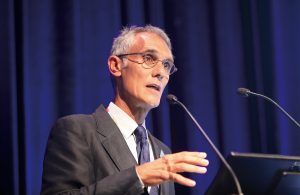
José L. Güell MD, PhD
Spain is now in the middle of a severe coronavirus outbreak. The virus can be found in all regions of the country, particularly in Madrid and Barcelona. One-fifth of the 50 million population is over the age of 65 and thus at increased risk of COVID-19.
José L. Güell MD, PhD spoke with
EuroTimes editor Sean Henahan, giving us an update on the coronavirus situation in Spain. Dr Güell is associate professor of Ophthalmology at Barcelona’s Autònoma University. He is also Past President of the European Society of Cataract and Refractive Surgery.
First of all, how are you doing?
I’m fine, we’re at home, observing the nationwide shutdown. The situation is a nightmare. I am only visiting the clinic for emergency cases. We expect it will be bad for at least two or three weeks.
Originally the suggestion was for us to treat only emergency cases, but now this is mandatory. Any private clinics in Catalonia are only handling emergencies. Ophthalmologists in private clinics have started covering emergencies within the national health system. The public system is so busy dealing with corona patients that they are not able to deal with specialty requirements. Many ophthalmologists within the public hospital system are being asked to fill other positions beyond ophthalmology. All private clinics with beds are now being used for corona cases by the national system.
What is the situation with testing?
Until recently the level of testing has been quite low, and tests were only available for those who were sick. Things are changing every 24 hours. We now have sufficient testing for senior care facilities, and for anybody sick or not sick who is working in healthcare. Within the near future we hope to have enough tests for everyone. It is a similar situation to what happened in Italy, is happening in France and will happen in the UK and other places.
We are using the PCR (polymerase chain reaction) tests, but this is a complex test, requiring special facilities to evaluate results. I would like to see broader availability for other testing methods that are cheap and offer quick results, then follow-up with the PCR in positive cases.
It is easy to speak in retrospect, but it does seem that the government response was slow. But everybody was slow. Some in the healthcare system had been calling for preparation for the pandemic a while ago, but not all were calling for hard measures early on.
What is the situation with personal protection equipment?
This is a critical issue, and should have been better planned. There is a significant lack of materials. I expect this situation to improve soon as efforts are now under way to make up the shortages. We need equipment for face protection, gloves and respirators for the OR. The situation varies regionally, with Madrid being the worst.
How is the public support for healthcare workers in Spain?
Every night at 8 pm, recently, everywhere, in small villages and large cities, there is a kind of public thank you. People stand on their balconies and clap together for healthcare workers returning from work. I hope they will include in their gratitude an appreciation not only for the healthcare workers, not just nurses and doctors, but all of the other people who are working in hospitals – the orderlies, the cleaning people, the maintenance and food service workers. They are taking equal amounts of risk.
What is your advice to colleagues in other areas?
I’m telling my colleagues in Europe and the US, first of all, stop. Coronavirus will be in your community if it is not already, so stop treating non-emergency cases. Ophthalmologists are among the most at-risk specialties because we work close with patients. Take all necessary precautions to protect yourself when treating patients, but also at home.

 José L. Güell MD, PhD
José L. Güell MD, PhD